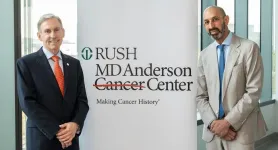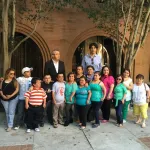(Press-News.org) Dr James Gill, a Clinical Lecturer at the University of Warwick and a practising GP, will attend a pivotal event hosted at the House of Lords on Monday (April 29) focused on combating the global crisis of antimicrobial resistance (AMR).
Antimicrobial resistance poses a formidable threat to communities worldwide, with projections indicating that by 2050, over 10 million deaths annually could be attributed to AMR, surpassing even the toll of cancer. In the face of this escalating emergency, effective communication is paramount. Health professionals and organisations play a crucial role in disseminating accurate, accessible information to raise awareness about critical health issues such as AMR.
Reflecting on the significance of the event, Dr James Gill said, "Antibiotics have been perceived as magic bullets, capable of swiftly addressing various ailments. However, their indiscriminate use poses significant risks, both in terms of adverse effects and the development of resistance."
Partnering with The Fleming Initiative, YouTube Health will collaborate to amplify awareness of this pressing global concern across social media platforms. Under the patronage of HRH Prince William and the leadership of Lord Ara Darzi, The Fleming Initiative represents a transformative alliance of policymakers, scientists, and behavioural change experts committed to combating AMR.
Dr Gill continued, "A fundamental shift in patient perception is imperative. Rather than viewing antibiotics as a panacea, patients must understand the potential harm associated with their misuse. Empowering patients to question the necessity of antibiotics and fostering a dialogue on appropriate usage is paramount in addressing the challenge of AMR."
While physicians are well-informed, there exists a pressing necessity to re-educate patients on the nuanced impact of antibiotics. Rather than viewing these medications as mere symptom alleviators, patients must understand the potential long-term harm, including disruptions to their gut microbiome and the development of antibiotic resistance. Dr Gill underscores the importance of fostering a shift in patient mindset, wherein individuals actively engage in discussions with their doctors, questioning the necessity of antibiotic prescriptions and considering alternative approaches.
By enhancing patient awareness, Dr Gill envisions a transformative outcome wherein patients adopt a more discerning approach towards antibiotic use, ultimately contributing to the collective effort in combating antimicrobial resistance.Dr James Gill, a Clinical Lecturer at the University of Warwick and a practising GP, will attend a pivotal event hosted at the House of Lords on Monday (April 29) focused on combating the global crisis of antimicrobial resistance (AMR).
Antimicrobial resistance poses a formidable threat to communities worldwide, with projections indicating that by 2050, over 10 million deaths annually could be attributed to AMR, surpassing even the toll of cancer. In the face of this escalating emergency, effective communication is paramount. Health professionals and organisations play a crucial role in disseminating accurate, accessible information to raise awareness about critical health issues such as AMR.
Reflecting on the significance of the event, Dr James Gill said, "Antibiotics have been perceived as magic bullets, capable of swiftly addressing various ailments. However, their indiscriminate use poses significant risks, both in terms of adverse effects and the development of resistance."
Partnering with The Fleming Initiative, YouTube Health will collaborate to amplify awareness of this pressing global concern across social media platforms. Under the patronage of HRH Prince William and the leadership of Lord Ara Darzi, The Fleming Initiative represents a transformative alliance of policymakers, scientists, and behavioural change experts committed to combating AMR.
Dr Gill continued, "A fundamental shift in patient perception is imperative. Rather than viewing antibiotics as a panacea, patients must understand the potential harm associated with their misuse. Empowering patients to question the necessity of antibiotics and fostering a dialogue on appropriate usage is paramount in addressing the challenge of AMR."
While physicians are well-informed, there exists a pressing necessity to re-educate patients on the nuanced impact of antibiotics. Rather than viewing these medications as mere symptom alleviators, patients must understand the potential long-term harm, including disruptions to their gut microbiome and the development of antibiotic resistance. Dr Gill underscores the importance of fostering a shift in patient mindset, wherein individuals actively engage in discussions with their doctors, questioning the necessity of antibiotic prescriptions and considering alternative approaches.
By enhancing patient awareness, Dr Gill envisions a transformative outcome wherein patients adopt a more discerning approach towards antibiotic use, ultimately contributing to the collective effort in combating antimicrobial resistance.
END
Antimicrobial resistance crisis: “Antibiotics are not magic bullets”
Dr James Gill, a Clinical Lecturer at the University of Warwick and a practising GP, will attend a pivotal event hosted at the House of Lords on Monday (April 29) focused on combating the global crisis of antimicrobial resistance (AMR)
2024-04-26
ELSE PRESS RELEASES FROM THIS DATE:
Florida dolphin found with highly pathogenic avian flu: Report
2024-04-26
The case of a Florida bottlenose dolphin found with highly pathogenic avian influenza virus, or HPAIV — a discovery made by University of Florida researchers in collaboration with multiple other agencies and one of the first reports of a constantly growing list of mammals affected by this virus — has been published in Communications Biology.
The report documents the discovery, the first finding of HPAIV in a cetacean in North America, from the initial response by UF’s Marine Animal Rescue team to a report of a distressed dolphin in Dixie County, Florida, to the subsequent identification of the virus from brain and tissue samples obtained in a postmortem ...
Barcodes expand range of high-resolution sensor
2024-04-26
The same geometric quirk that lets visitors murmur messages around the circular dome of the whispering gallery at St. Paul’s Cathedral in London or across St. Louis Union Station’s whispering arch also enables the construction of high-resolution optical sensors. Whispering-gallery-mode (WGM) resonators have been used for decades to detect chemical signatures, DNA strands and even single molecules.
In the same way that the architecture of a whispering gallery bends and focuses sound waves, WGM microresonators confine and concentrate light in a tiny circular path. This enables WGM resonators ...
DOE Under Secretary for Science and Innovation visits Jefferson Lab
2024-04-26
NEWPORT NEWS, VA – On April 18, the U.S. Department of Energy’s Thomas Jefferson National Accelerator Facility welcomed Under Secretary for Science and Innovation Geraldine (Geri) Richmond for a tour of the lab and briefing on its research mission, innovation and STEM programs.
Throughout the day, much of the conversation centered on a common theme of how the lab is working to ensure it is a hub of engagement, partnership, and access for researchers, students, community leaders and others. Ensuring diverse communities have access to the programs, ...
Research expo highlights student and faculty creativity
2024-04-26
Hundreds of faculty, students and business leaders flocked to The University of Texas at Arlington for its second annual Research and Innovation Expo, an event designed to showcase the University’s research efforts.
“This is an event where we can showcase our research achievements and encourage everyone to learn about and engage with other investigators outside their own fields,” said Eileen Clements, interim executive director of the UT Arlington Research Institute and an organizer of the event.
Researchers learned how ...
Imaging technique shows new details of peptide structures
2024-04-26
By Leah Shaffer
A new imaging technique developed by engineers at Washington University in St. Louis can give scientists a much closer look at fibril assemblies, stacks of peptides like amyloid beta, most notably associated with Alzheimer’s disease.
These cross-β fibril assemblies are also useful building blocks within designer biomaterials for medical applications, but their resemblance to their amyloid beta cousins, whose tangles are a symptom of neurodegenerative disease, is concerning. Researchers want ...
MD Anderson and RUSH unveil RUSH MD Anderson Cancer Center
2024-04-26
The University of Texas MD Anderson Cancer Center and RUSH University System for Health today announced a partnership to create RUSH MD Anderson Cancer Center. The partnership represents advanced clinical and operational integration in the delivery of cancer care, providing RUSH patients greater access to cancer treatments and research considered among the best in the world.
MD Anderson is one of the nation’s leading cancer centers and its team of experts is devoted exclusively to cancer patient care, research, education ...
Tomography-based digital twins of Nd-Fe-b magnets
2024-04-26
1. NIMS has succeeded in simulating the magnetization reversal of Nd-Fe-B magnets using large-scale finite element models constructed based on tomographic data obtained by electron microscopy. Such simulations have shed light on microstructural features that hinder the coercivity, which quantifies a magnet’s resistance to demagnetization in opposing magnetic fields. New tomography-based models are expected to guide toward the development of sustainable permanent magnets with ultimate performance.
2. Green power generation, electric transportation, and other high-tech industries rely heavily on ...
People with rare longevity mutation may also be protected from cardiovascular disease
2024-04-26
A new study highlights possible cardiovascular health advantages in individuals with a rare condition known as growth hormone receptor deficiency (GHRD), also called Laron syndrome.
GHRD, which is characterized by the body’s impaired ability to use its own growth hormone and results in stunted growth, has been linked in mice to a record 40% longevity extension and lower risks for various age-related diseases. However, the risk of cardiovascular disease in individuals with GHRD has remained ...
Mobile device location data is already used by private companies, so why not for studying human-wildlife interactions, scientists ask
2024-04-26
When did you last go anywhere without your cell phone? From maps and weather apps to social media platforms, we give consent for our phones to trace our footsteps and behavior. These curated mobility data are often used for personalized advertisements. In a commentary, published April 26 in the journal Cell Reports Sustainability, scientists argue mobility data can offer so much more—it is key to understanding human-wildlife interactions for guiding policy decisions on sustainability-related issues and should be free and accessible for research.
As ...
Test reveals mice think like babies
2024-04-26
Are mice clever enough to be strategic?
Kishore Kuchibhotla, a Johns Hopkins University neuroscientist who studies learning in humans and animals, and who has long worked with mice, wondered why rodents often performed poorly in tests when they knew how to perform well. With a simple experiment, and by acting as “a little bit of a mouse psychologist,” he and his team figured it out.
“It appears that a big part of this gap between knowledge and performance is that the animal is engaging in a form of ...
LAST 30 PRESS RELEASES:
Cost of copper must rise double to meet basic copper needs
A gel for wounds that won’t heal
Iron, carbon, and the art of toxic cleanup
Organic soil amendments work together to help sandy soils hold water longer, study finds
Hidden carbon in mangrove soils may play a larger role in climate regulation than previously thought
Weight-loss wonder pills prompt scrutiny of key ingredient
Nonprofit leader Diane Dodge to receive 2026 Penn Nursing Renfield Foundation Award for Global Women’s Health
Maternal smoking during pregnancy may be linked to higher blood pressure in children, NIH study finds
New Lund model aims to shorten the path to life-saving cell and gene therapies
Researchers create ultra-stretchable, liquid-repellent materials via laser ablation
Combining AI with OCT shows potential for detecting lipid-rich plaques in coronary arteries
SeaCast revolutionizes Mediterranean Sea forecasting with AI-powered speed and accuracy
JMIR Publications’ JMIR Bioinformatics and Biotechnology invites submissions on Bridging Data, AI, and Innovation to Transform Health
Honey bees navigate more precisely than previously thought
Air pollution may directly contribute to Alzheimer’s disease
Study finds early imaging after pediatric UTIs may do more harm than good
UC San Diego Health joins national research for maternal-fetal care
New biomarker predicts chemotherapy response in triple-negative breast cancer
Treatment algorithms featured in Brain Trauma Foundation’s update of guidelines for care of patients with penetrating traumatic brain injury
Over 40% of musicians experience tinnitus; hearing loss and hyperacusis also significantly elevated
Artificial intelligence predicts colorectal cancer risk in ulcerative colitis patients
Mayo Clinic installs first magnetic nanoparticle hyperthermia system for cancer research in the US
Calibr-Skaggs and Kainomyx launch collaboration to pioneer novel malaria treatments
JAX-NYSCF Collaborative and GSK announce collaboration to advance translational models for neurodegenerative disease research
Classifying pediatric brain tumors by liquid biopsy using artificial intelligence
Insilico Medicine initiates AI driven collaboration with leading global cancer center to identify novel targets for gastroesophageal cancers
Immunotherapy plus chemotherapy before surgery shows promise for pancreatic cancer
A “smart fluid” you can reconfigure with temperature
New research suggests myopia is driven by how we use our eyes indoors
Scientists develop first-of-its-kind antibody to block Epstein Barr virus
[Press-News.org] Antimicrobial resistance crisis: “Antibiotics are not magic bullets”Dr James Gill, a Clinical Lecturer at the University of Warwick and a practising GP, will attend a pivotal event hosted at the House of Lords on Monday (April 29) focused on combating the global crisis of antimicrobial resistance (AMR)






